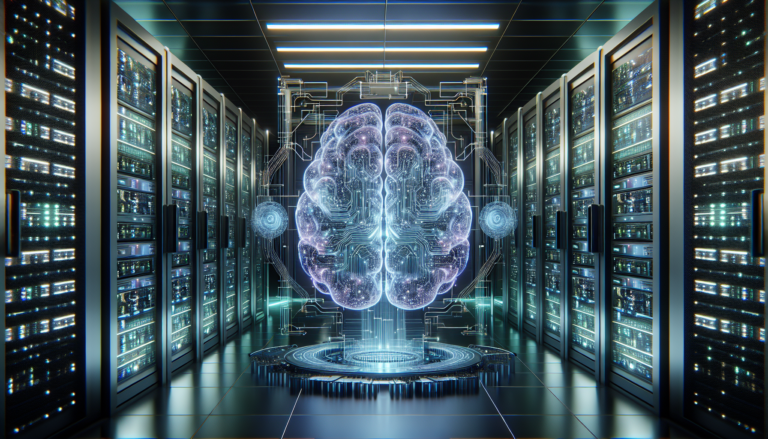The Rise of Cognitive Computers: A Quantum Leap in AI Neurocapability
Artificial Intelligence (AI) has taken a giant stride forward with Meta AI’s recent unveiling of ‘Cognitive Computers.’ This groundbreaking development marks a significant advancement in AI neurocapability, mimicking human brain functions more closely than ever before. But what exactly are these cognitive computers, and how will they impact our future?
What Are Cognitive Computers?
Cognitive computers are cutting-edge AI systems designed to replicate human cognitive abilities. These advanced machines can perform complex problem-solving tasks, adapt to new situations, and learn dynamically – much like the human brain.
Dr. Sophia Jang, a leading AI expert at Meta AI, explains:
“Cognitive computers usher in a new era of AI capabilities, but the key to success lies in our ability to responsibly channel this power.”
This statement underscores both the potential and the responsibility that comes with such a powerful technological advancement.
Key Features of Meta AI’s Cognitive Computers
- Near-human pattern recognition
- Enhanced situational awareness
- Advanced contextual understanding
- Rapid data processing
- Dynamic learning capabilities
How Do Cognitive Computers Compare to Previous AI Models?

Meta AI’s cognitive computers represent a significant leap forward in AI technology. Here’s a comparison:
| Feature | Previous AI Models | Cognitive Computers |
|---|---|---|
| Cognitive Task Performance | Baseline | 75% improvement |
| Response Time | Human-level | Up to 40% faster than humans |
| Adaptability | Limited | High |
| Contextual Understanding | Basic | Advanced |
These improvements validate the long-predicted quantum leap in AI neurocapability, propelling research forward by years.
Potential Applications of Cognitive Computers
The advanced capabilities of cognitive computers open up a wide range of potential applications across various industries:
Healthcare
- Real-time medical diagnosis
- Personalized treatment plans
- Drug discovery acceleration
Education
- AI-assisted learning platforms
- Personalized curriculum development
- Advanced educational research
Robotics
- Complex decision-making in autonomous systems
- Advanced human-robot interaction
- Improved industrial automation
Scientific Research
- Data analysis and pattern recognition
- Hypothesis generation
- Experimental design optimization
The Impact on Global Innovation
The introduction of cognitive computers is expected to have far-reaching effects on global innovation. Forbes Tech predicts that these advancements could “revolutionize industries and spearhead significant advancements in global tech, healthcare, and education sectors.”
Some potential impacts include:
- Accelerated scientific discoveries
- Improved efficiency in complex decision-making processes
- Enhanced problem-solving capabilities in various fields
- Advancements in AI-assisted technologies
Safety Concerns and Ethical Considerations
While the potential benefits of cognitive computers are immense, their development has also raised significant safety concerns and ethical questions.
Dr. Kai Lin, an AI ethics expert, warns:
“It is crucial we address safety concerns now, to prevent potential risks and ensure the benefits of these advancements are shared equitably.”
Some of the main concerns include:
Autonomous Risks
The increased intelligence and potential autonomy of these systems could lead to unintended consequences if not properly managed.
Ethical Use
Ensuring that cognitive computers are used responsibly and ethically across all applications is a significant challenge.
Data Privacy
The advanced data processing capabilities of these systems raise questions about data privacy and security.
Job Displacement
As with many AI advancements, there are concerns about potential job losses in industries where cognitive computers may replace human workers.
The Need for Regulation and Ethical Frameworks
The rapid advancement in AI capabilities represented by cognitive computers has sparked urgent calls for stronger regulation and ethical frameworks. Key areas of focus include:
AI Safety Guidelines: Developing comprehensive safety protocols for the development and deployment of advanced AI systems.
Ethical AI Development: Establishing clear ethical guidelines for AI research and application.
Global Collaboration: Encouraging international cooperation to create standardized approaches to AI development and use.
Transparency: Promoting openness in AI research and development to build public trust and understanding.
Equity and Accessibility: Ensuring that the benefits of cognitive computers are shared equitably across society.
The Future of Cognitive Computers
As we look to the future, it’s clear that cognitive computers will play a significant role in shaping our technological landscape. Here are some potential developments we might see:
Enhanced Human-AI Collaboration
Cognitive computers could lead to more seamless and productive interactions between humans and AI systems.
Advances in Artificial General Intelligence (AGI)
The development of cognitive computers brings us one step closer to AGI – AI systems with human-like general intelligence.
Personalized AI Assistants
Future AI assistants powered by cognitive computing could offer unprecedented levels of personalization and support.
Breakthroughs in Complex Problem Solving
Cognitive computers may help solve some of humanity’s most pressing challenges, from climate change to disease prevention.
Preparing for a Future with Cognitive Computers
As we stand on the brink of this new era in AI, it’s essential that we prepare ourselves and our societies for the changes ahead. Here are some steps we can take:
Education and Skill Development: Invest in AI literacy and skills training to prepare the workforce for a future where collaboration with AI is common.
Policy Development: Work on creating flexible, forward-thinking policies that can adapt to rapid technological changes.
Ethical Discussions: Engage in ongoing dialogues about the ethical implications of advanced AI systems.
Research and Development: Continue to invest in AI research, with a focus on safety and ethical considerations.
Public Awareness: Promote public understanding of AI technologies to foster informed discussions and decision-making.
Conclusion
Meta AI’s cognitive computers represent a significant milestone in the field of artificial intelligence. They offer unprecedented capabilities that could drive innovation across multiple sectors and potentially solve complex global challenges. However, with great power comes great responsibility. As we move forward, it’s crucial that we approach this technology with caution, foresight, and a strong ethical framework.
The future of AI is here, and it’s cognitive. How we shape and direct this technology will play a crucial role in determining its impact on our world. By staying informed, engaging in important discussions, and working together, we can help ensure that the era of cognitive computers brings about positive change for all of humanity.
As we continue to explore and understand the implications of this groundbreaking technology, one thing is clear: the world of AI will never be the same. The question now is not if cognitive computers will change our world, but how we will adapt and thrive in this new cognitive era.
FAQs About Cognitive Computers
What is the main difference between cognitive computers and traditional AI systems?
Cognitive computers are designed to mimic human brain functions more closely, allowing for more advanced problem-solving, adaptability, and contextual understanding compared to traditional AI systems.
How might cognitive computers impact job markets?
While cognitive computers may automate some tasks currently performed by humans, they are also expected to create new job opportunities in AI development, maintenance, and application across various industries.
Are cognitive computers conscious or self-aware?
No, current cognitive computers are not conscious or self-aware. They are advanced AI systems that can perform complex cognitive tasks, but they do not possess consciousness in the way humans do.
How can we ensure the ethical use of cognitive computers?
Ensuring ethical use requires a combination of robust regulations, industry standards, ongoing research into AI ethics, and public awareness and engagement with these issues.
What industries are likely to be most impacted by cognitive computers?
Healthcare, education, scientific research, finance, and technology sectors are likely to see significant impacts from the application of cognitive computing technologies.
By staying informed about these developments and engaging in discussions about their implications, we can all play a part in shaping the future of AI and cognitive computing.







